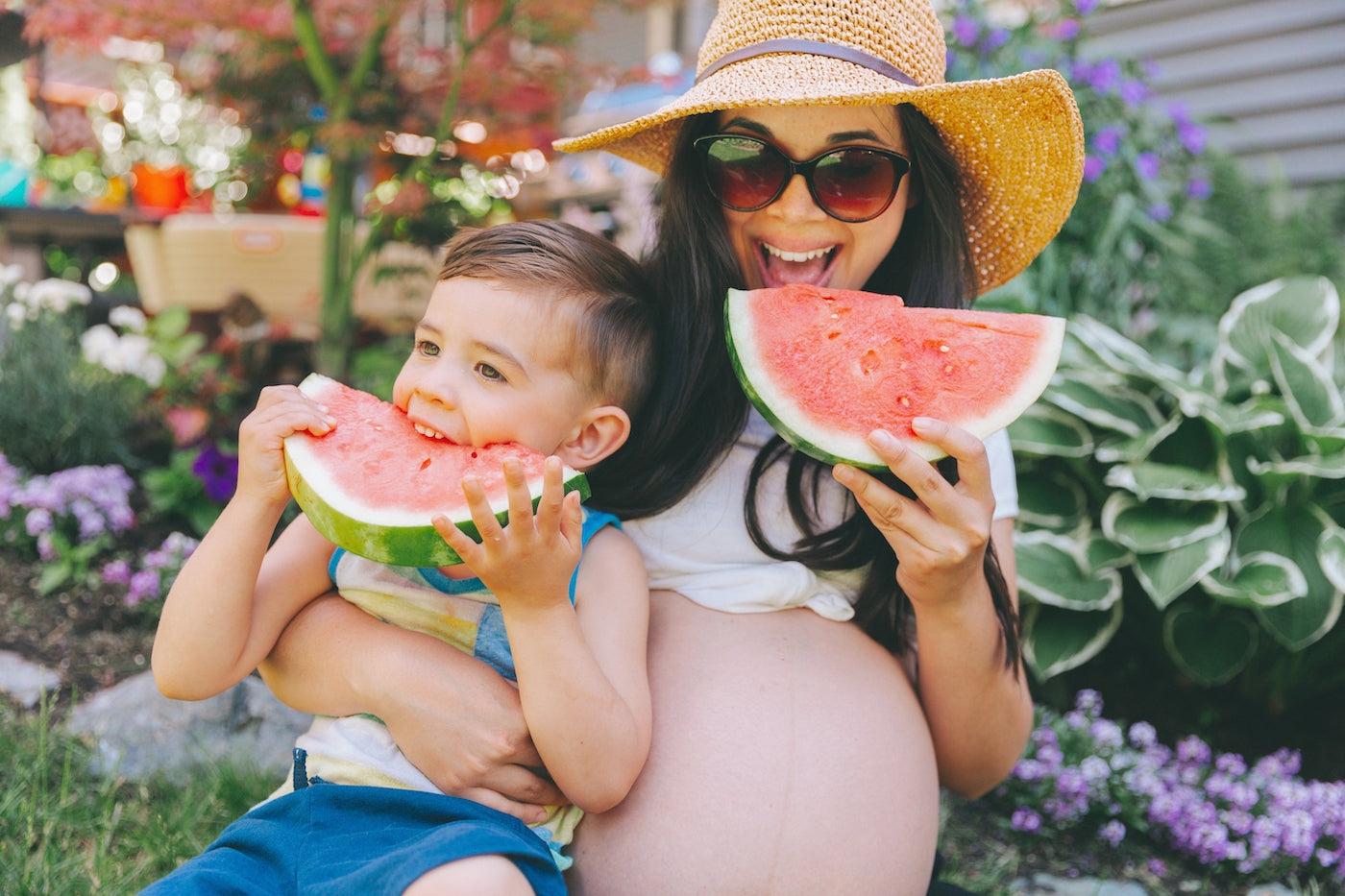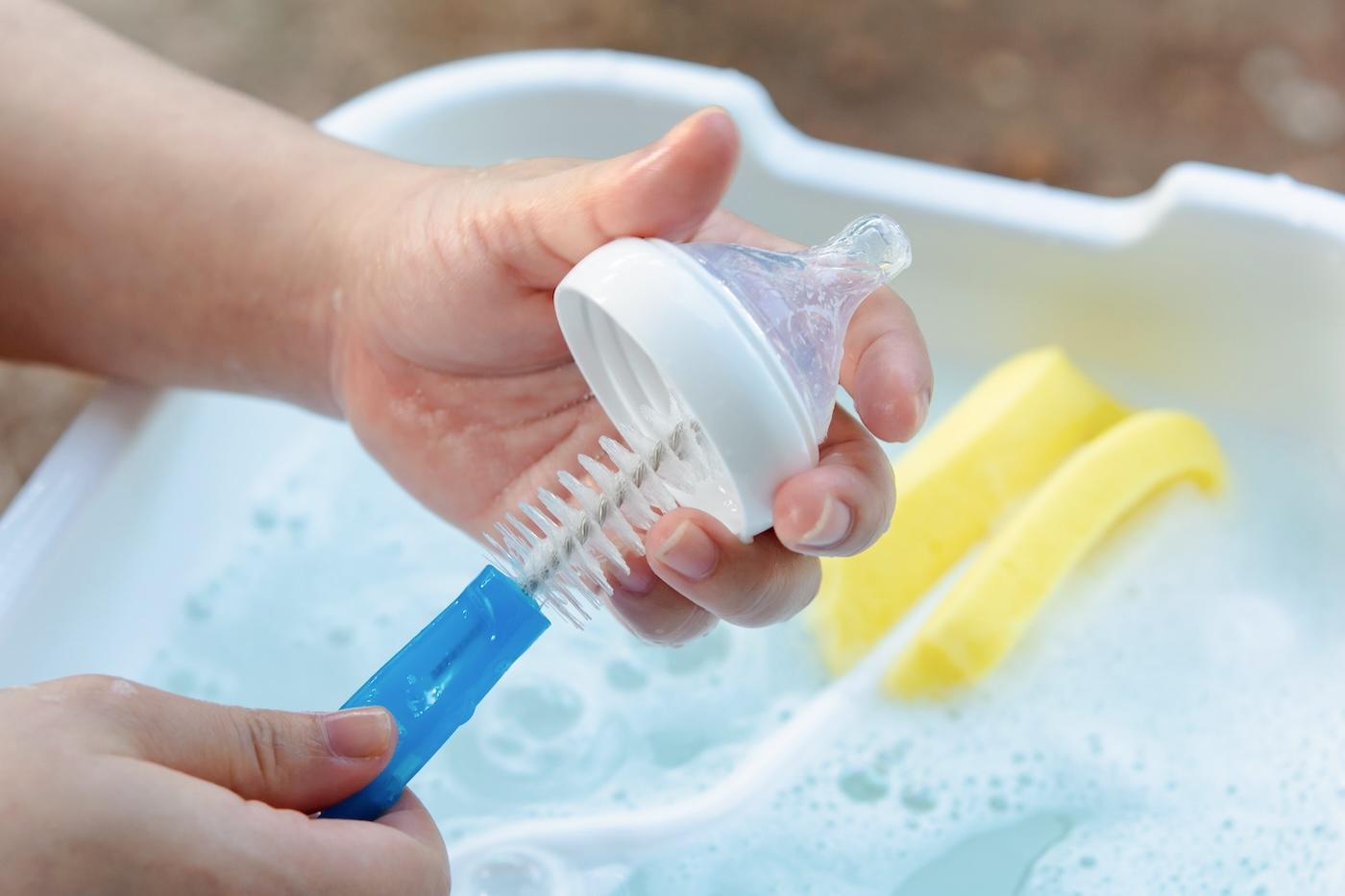BABY
9 Surprisingly Hydrating Foods—and How to Serve Them to Babies and Toddlers
As temperatures rise, add these water-rich foods to your bub’s plate.

Written by
Gabrielle McPherson, MS, RDN, LDN

Water plays a big role in keeping us happy and healthy—and that goes for kids, too! Staying well-hydrated helps your tot absorb nutrients from food, helps their body work properly, and keeps poo soft to prevent constipation. Babies under a year get the bulk of their hydration from breastmilk or formula, while toddlers over 12 months can have water, cow or fortified plant-based milk, too. And while drinking fluids does the heavy lifting when it comes to hydration—supplying 80% of our water needs—20% actually comes from food!
So especially as the temperatures rise, in addition to topping off your tot’s cup, consider adding some hydrating foods to their plate as well. Read on to find out the best hydrating foods—and the how to serve them to babies and toddlers!
Watermelon
Yep, water is the key word in this superstar hydrator. The summertime fruit is famous for its vibrant ruby-red color and sweet flavors. Its juiciness is all thanks to its 91% water content, proving its worth as a hydrating snack packed with nutrients. Watermelons are rich in potassium for healthy fluid balance and antioxidants, including beta carotene, vitamin A, and lycopene for eyesight and heart health.
How to Serve Watermelon to Babies and Toddlers:
- Babies 6 months+: Offer a stick of watermelon your babe can grip and munch or puree it.
- Babies 9 months+: Chop watermelon into cubes for easy eats.
- Toddlers: Offer a watermelon wedge, with rind, for an antioxidant-rich snack.
Zucchini
Made up of 95% of water, this summer veggie is squashing other foods (even watermelon!) in the hydration department. Zucchini is an excellent food for babies because it’s a source of choline for healthy brains and lutein and zeaxanthin for vision support. Remember to always cook zucchini before offering it to your tot to prevent choking.
How to Serve Zucchini to Babies and Toddlers:
- Babies 6 months+: Offer a stick of cooked skinless zucchini your babe can grip and munch or puree it.
- Babies 9 months+: Chop cooked zucchini into small pieces for easy eats.
- Toddlers: Offer cooked zucchini wedges your toddler can dip into their favorite sauce.
Strawberries
The popular berry is chock-full of water (91% to be exact!) to help your babe stay hydrated. Vitamin C and folate promote skin healing and the development of healthy cells. Some little ones may react to strawberries, thanks to a common and typically minor condition called oral allergy syndrome, so see the pediatrician if your little one has redness or swelling after eating strawberries.
How to Serve Strawberries to Babies and Toddlers:
- Babies 6 months+: Offer a strawberry puree mixed with yogurt.
- Babies 9 months+: Chop strawberries into small pieces your babe can pick up.
- Toddlers: Give your toddler chopped or whole strawberries large enough not to go into the mouth at once.
Cantaloupe
A refreshing snack for picnics or a tasty after-dinner treat, cantaloupe melons contain 90% water to help your babe meet their hydration needs. Cantaloupe belongs to the same family as other fluid-rich produce, like cucumbers and honeydew melon. Selenium, beta carotene, vitamin C, lutein, and zeaxanthin are some of their many nutrients—all essential for healthy development in babies and toddlers.
How to Serve Cantaloupe:
- Babies 6 months+: Offer long, thin, but wide strips of fresh cantaloupe for your baby to grip or puree with another fruit, like mangoes.
- Babies 9 months+: Chop cantaloupe into small flat pieces.
- Toddlers: Give your toddler a wedge of cantaloupe with the rind for a stable grasp.
Plain Yogurt
While one might not think of dairy foods as thirst-quenching, plain yogurt has significant amounts of water, not to mention plenty of nutrients for growing kiddos. You can find 85% water in plain yogurt and bone-supporting nutrients, including calcium, vitamin D, phosphorus, and potassium.
How to Serve Yogurt to Babies and Toddlers:
Plain yogurt is one of the easiest foods for babies and toddlers to eat, though it can be messy! It can be slightly tart, so sweeten up plain yogurt by pureeing it with fresh fruits and oats for superb nutrition.
For babies aged 6 months to 2 years, it’s best to choose a full-fat plain yogurt to support how quickly they grow (plus additional hydration)! Plain Greek yogurt contains about 81% water and can be a great option too.
Carrots
We’re rooting for carrots as a hydrating food for babies! (Get it??) Carrots are known for their carotenoids, the antioxidants responsible for their bright orangey hues that aid your tot’s vision. In addition to being made up of 89% water, they’re a fiber-rich first food. Carrots are naturally solid, so cooking is critical to lessen choking risks.
How to Serve Carrots to Babies and Toddlers:
- Babies 6 months+: Offer long, thin, well-cooked strips or pureed carrots.
- Babies 9 months+: Grate cooked carrots into tiny shreds.
- Toddlers: Give your toddler cooked carrot quarts they can nosh at mealtimes.
Peaches
It’s not quite summer without peaches! The stone fruit is loaded with antioxidants like beta-carotene. Peaches are sweet, juicy, and made of 89% water. Ripe and juicy peaches are worth the wait and are easier for babies and toddlers to safely eat. Be mindful of the peach skin and consider removing it for babies.
How to Serve Peaches to Babies and Toddlers:
- Babies 6 months+: Puree peaches and sprinkle with cinnamon.
- Babies 9 months+: Cut soft peaches into soft pieces or strips.
- Toddlers: Give your toddler bite-sized pieces of peach.
Oranges
Bursting with flavor, nutrients, and hydration, oranges contain 87% water. The mouthwatering fruit is brimming with vitamin C, which helps your babe absorb iron for healthy oxygen flow throughout the body. Oranges are good at providing folate for healthy cell development, and potassium—an essential mineral. Whether blood orange, mandarin orange, or tangerines, there are plenty of citrusy options to satisfy your baby’s tastebuds. Canned mandarin oranges in their juices already have the skin removed and can be easy to offer babies cut up.
How to Serve Oranges to Babies and Toddlers:
- Babies 6 months+: Remove orange skins and cut them into small pieces or puree them with bananas.
- Babies 9 months+: Remove orange skins and cut them into small pieces.
- Toddlers: Give your toddler bite-sized pieces of oranges with the skin on.
Eggs
From age 6 months onwards, it’s safe for littles to eat whole, cooked eggs. Eggs supply babies and toddlers with protein, iron, choline, and many other nutrients that ensure healthy blood, muscle, bone growth, and brain development. A lesser-known fact is that eggs are 75% water and can help keep your babe stay nourished and hydrated.
How to Serve Eggs to Babies and Toddlers:
- Babies 6 months+: soft scrambled eggs
- Babies 9 months+: cut-up boiled eggs or scrambled egg pieces
- Toddlers: boiled egg or omelet strips
Final Thoughts on Hydrating Foods
Readiness for specific foods (cut-up versus pureed, for example) varies from one eater to the next. It helps to remember that not all babies are ready at the same time. Your safest bet is to go at your little one’s pace and speak to your pediatrician or dietitian if you have concerns about your baby’s feedings. Always stay with your baby—especially when they’re eating—so you can act quickly during a choking episode.
More on Feeding Babies and Toddlers:
- Brain-Boosting Foods for Babies and Toddlers
- Iron-Rich Foods for Babies and Toddlers
- Fiber-Rich Foods for Babies and Toddlers
- Portion-Size Guide for Babies
- Amazing Grains to Add to Your Baby’s Plate
***
REFERENCES- American Academy of Pediatrics: Signs of Deyhdration in Infants and Children
- Nemours Children’s Health: Dehydration
- Mayo Clinic: How Much Water Should You Drink Every Day?
- U.S. Department of Agriculture FoodData Central: Watermelon
- U.S. Department of Agriculture FoodData Central: Squash, Summer, Zucchini
- U.S. Department of Agriculture FoodData Central: Strawberries
- Stanford Health Care: Oral Allergy Syndrome
- U.S. Department of Agriculture FoodData Central: Cantaloupe
- U.S. Department of Agriculture FoodData Central: Yogurt, Plain, Whole Milk
- U.S. Department of Agriculture FoodData Central: Yogurt, Greek, Plain, Whole Milk
- U.S. Department of Agriculture FoodData Central: Carrots
- U.S. Department of Agriculture FoodData Central: Peaches
- U.S. Department of Agriculture FoodData Central: Oranges
- U.S. Department of Agriculture FoodData Central: Egg
Disclaimer: The information on our site is NOT medical advice for any specific person or condition. It is only meant as general information. If you have any medical questions and concerns about your child or yourself, please contact your health provider.
SHARE THIS ARTICLE
MOST LOVED
Sleepytime Sidekicks
More on Baby
About Gabrielle McPherson, MS, RDN, LDN
Gabrielle McPherson, MS, RDN, LDN is registered dietitian in Missouri who specializes in community and pediatric nutrition. Gaby is passionate about encouraging families to eat well in simple, practical ways that are realistic...and delicious! When not working, Gaby loves cooking, baking, and making messes and memories with her sous-chef/preschooler Charlotte.












